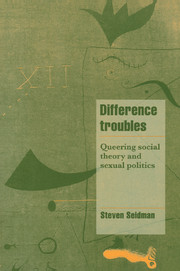Book contents
- Frontmatter
- Contents
- Preface
- Acknowledgements
- Introduction: the contemporary reconfiguring of social theory
- Part I Resisting difference: the malaise of the human sciences
- 1 The political unconscious of the human sciences
- 2 The end of sociological theory
- 3 Relativizing sociology: the challenge of cultural studies
- 4 The refusal of sexual difference: queering sociology
- 5 Difference troubles: the flight of sociology from “otherness”
- Part II Engaging difference: from lesbian and gay studies to queer theory
- Part III Democratic prospects: the politics of knowledge and identity
- Epilogue: pragmatism, difference and a culture of strong democracy
- Notes
- References
- Index
1 - The political unconscious of the human sciences
from Part I - Resisting difference: the malaise of the human sciences
Published online by Cambridge University Press: 05 October 2010
- Frontmatter
- Contents
- Preface
- Acknowledgements
- Introduction: the contemporary reconfiguring of social theory
- Part I Resisting difference: the malaise of the human sciences
- 1 The political unconscious of the human sciences
- 2 The end of sociological theory
- 3 Relativizing sociology: the challenge of cultural studies
- 4 The refusal of sexual difference: queering sociology
- 5 Difference troubles: the flight of sociology from “otherness”
- Part II Engaging difference: from lesbian and gay studies to queer theory
- Part III Democratic prospects: the politics of knowledge and identity
- Epilogue: pragmatism, difference and a culture of strong democracy
- Notes
- References
- Index
Summary
The human sciences or what we sometimes call the behavorial and social sciences have not been especially friendly towards the idea of the unconscious. Even in psychology, at least in the United States, the unconscious has not fared well. As in the broader culture of the United States, the individual who is made into an object of psychological knowledge is typically an ego-centered, present-centered self. The idea of a self driven by unconscious wishes and desires is troubling to an American culture which celebrates the self-made individual and whose political culture relies heavily on a code of self-reliance and individual responsibility. Not surprisingly, the unconscious as psychological force has not played much of a role in sociology. Sociological paradigms such as conflict theory, exchange theory, rational choice theory, marxism, and (American styled) structural sociology construct a self which is egocentric. And yet, this self-interested, rational calculating, present-centered self is, according to sociological conventional wisdom, a self which is formed and moved by forces unseen by the individual. Sociology is unthinkable without a notion of a sociological unconscious. However, in contrast to the Freudian unconscious with its illogic of perverse desire relentlessly transgressive and decentering, the sociological unconscious is productive of social order.
Two quick examples. In The Division of Labor in Society, Durkheim argues that in traditional societies the lack of structural heterogeneity and interdependence makes possible cultural uniformity which, in turn, produces societal cohesion. Recall that Durkheim insisted that traditional type societies are intolerant of individualism and social difference. Deviation from common belief and practice threatens social solidarity. If it is only cultural unity which provides social coherence, difference is socially subversive.
- Type
- Chapter
- Information
- Difference TroublesQueering Social Theory and Sexual Politics, pp. 21 - 42Publisher: Cambridge University PressPrint publication year: 1997
- 8
- Cited by

